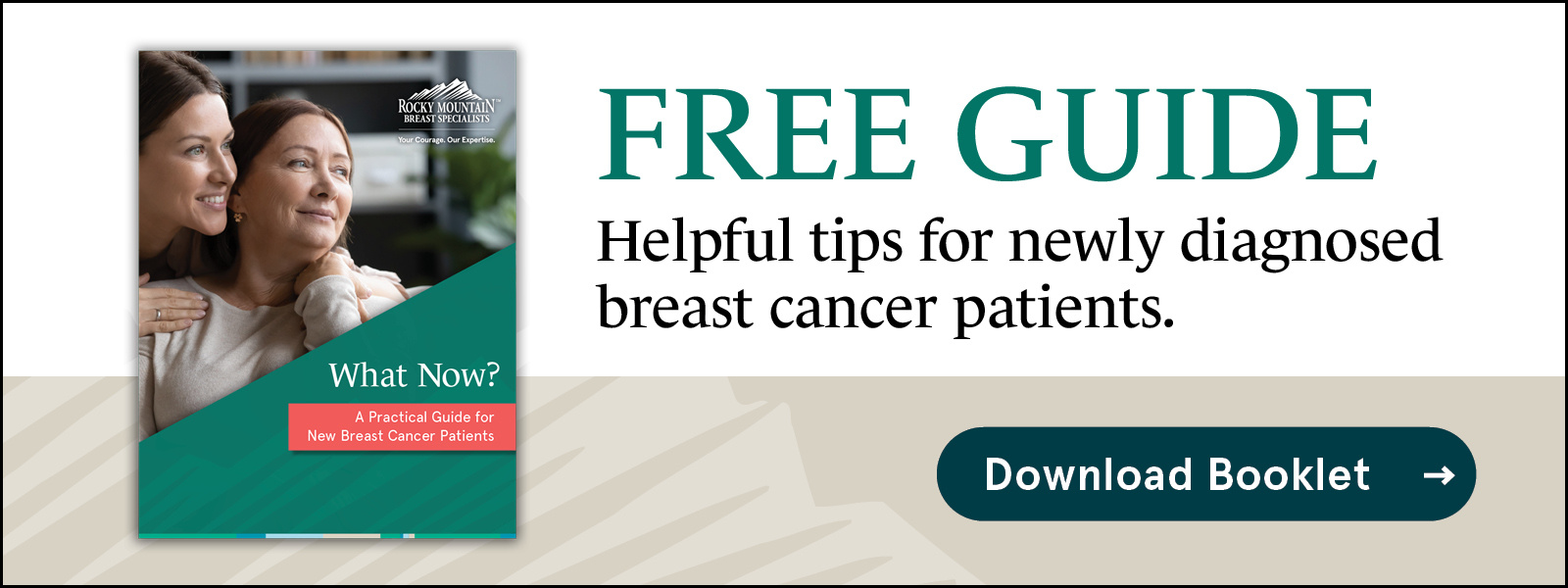Early Stage Breast Cancer: What is it? What to Expect
7 min read

Early detection is one of the most important factors in beating any type of cancer. Because breast cancer doesn't usually show signs in the early stages, a screening mammogram is typically the way it is found. Thanks to more women getting their mammograms on a regular schedule, breast cancer specialists are caring for more patients with cancer in its earlier stages. How does that look different from later-stage cancer treatment, and how do the outcomes differ?
The Importance of Staging in Breast Cancer Treatment Options
The size of the tumor mainly determines the stage of breast cancer and whether it has spread beyond the breast to lymph nodes or other areas of the body. Early-stage breast cancer is smaller and hasn't spread at all or only to a couple of lymph nodes closest to the breast where the cancer was found. Learn more about breast cancer staging.
Among the various classifications of breast cancer, one category assigned is determined by the extent to which the cancer has spread. The patient will be identified with one of the following:
- Early-stage breast cancer: Breast cancer is within the tissues of the breast or the axillary lymph nodes (lymph nodes present in the underarm area). This includes patients with ductal carcinoma in situ (DCIS, sometimes referred to as stage 0) as well as stages 1, 2A, 2B, and sometimes 3A breast cancers.
- Locally advanced breast cancer: Cancer has spread beyond the breast tissues and affected many axillary lymph nodes. This includes the various levels of stage 3.
- Metastatic breast cancer: Also referred to as distant breast cancer, there are cancer cells found in other areas of the body; this is also referred to as stage 4. The most common places that breast cancer cells will move to include the bones, liver, and lungs/chest wall.
Read Erika's story about metastatic breast cancer.
Breast Cancer Stages
Early-Stage Breast Cancer Treatment Options
It's best to work with a breast cancer oncologist who specializes in the various types of breast cancer and how the different types react to the treatment options available today.
Oncologists personalize breast cancer treatments based on the cancer stage, age, health status, and specific patient needs. Cancer treatment for early-stage cancers can include surgery, chemotherapy, targeted therapy, radiation therapy, and immunotherapy, which is similar to what other stages may need. However, early-stage patients may not need as many treatments as someone who has a later-stage breast cancer diagnosis.
Breast Cancer Surgery
Surgery is almost always the primary breast cancer treatment. For patients with early-stage breast cancer, it's often the first step in the treatment process. If you're not at high risk of recurrence, your breast surgeon will most likely recommend a breast-sparing surgery called a lumpectomy. Only the area of the breast where the tumor is located is removed, along with a margin of healthy cells surrounding the tumor, to be sure as many cancer cells are removed as possible.
A mastectomy, or total breast removal, is less likely for early-stage patients. If you have the BRCA gene mutation, your breast surgeon may recommend the removal of the entire breast since recurrence is more likely.
Read more in our blog: Lumpectomy vs Mastectomy: Two Surgical Options for Treating Breast Cancer
For both types of surgery, there is usually some testing and removal of at least some lymph nodes to see if the cancer has spread there. Typically, for early-stage breast cancer patients, only a few lymph nodes near the armpit need to be removed, or in some cases, none at all.
Lumpectomy vs Mastectomy
Radiation Therapy for Early-Stage Breast Cancer
Oncologists recommend radiation therapy after breast cancer surgery because it lowers the likelihood that cancer will return by killing the remaining cancer cells.
External radiation therapy is a common way to treat breast cancer. The patient comes into the office 5 days a week for 6-8 weeks for a short treatment with the linear accelerator. It doesn't hurt, but it is very time-consuming. There are also side effects like fatigue, redness, and skin sensitivity where the radiation is aimed.
For patients with early-stage breast cancer, another type of radiation therapy may be an option called High Dose Rate Brachytherapy. For this type of internal radiation treatment, a tube is inserted in the breast and left there. Over 5 days (or so), a radioactive pellet is inserted into the tube to treat the area inside the breast where the cancer is located. The pellet is removed and then replaced again a few times each day. Once the five days are over, the tube is removed, and the treatment is complete. This comes with fewer side effects than external radiation and shortens the overall treatment time.
Your radiation oncologist, who works closely with your breast surgeon and medical oncologist, will determine if HDR internal radiation therapy is an option for you.
Other Treatments for Early-Stage Breast Cancer
Surgery is rarely used as a standalone treatment for breast cancer. Oncologists often recommend a combination of radiation therapy, chemotherapy, hormone therapy, or targeted therapy after surgery. The exact combination depends not only on the stage but also on the hormone status and HER2 status of the cancer.
What to Expect If You Are Diagnosed with Early-Stage Breast Cancer
When found early, breast cancer patients have a very high likelihood of living a long and happy life as cancer survivors. The American Cancer Society reports that localized breast cancer survivors have a 99% chance of 5-year survival. Regional cancer that is still early stage but has moved to local lymph nodes has an 86% chance of 5-year survival. Compare this to patients with distant breast cancer (metastatic) who have an average of a 28% 5-year survival rate, and you'll quickly see why regular mammograms and self-monitoring can be lifesavers!
You will have cancer treatments and a journey ahead of you, but it will most likely be shorter than if it was found at a later stage.
Find the Right Breast Cancer Specialist for You in Colorado
At Rocky Mountain Breast Specialists, we treat patients with breast cancer of all stages throughout Colorado. Our breast cancer specialists are up-to-date on the latest treatments for various types of cancer. We're also actively participating in clinical research to help find new and better ways to care for breast cancer patients. Our dedicated team is available to help you if you need it.
Learn more about who is on your breast cancer treatment team.
If you would like to schedule an initial consultation or would like a second opinion about breast cancer treatment options, request an appointment at the location most convenient for you.
Updated December 2023

